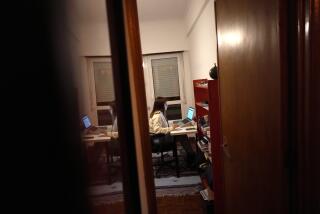TV REVIEW : Workplace ‘Privacy’ in the ‘90s
- Share via
After viewing the latest edition of “First Person With Maria Shriver,” ominously titled “Big Brother Is My Boss” (at 9 tonight on NBC, Channels 4, 36 and 39), you can’t help but wonder whether Shriver’s snooping into the invasive tactics of employers surveilling workers is going to get her in trouble with her own Big Brother.
Shriver’s investigation never goes as far as inquiring into the “security” practices of NBC’s parent company, General Electric, but it makes you wonder about big GE when less high-tech corporations, ranging from Sheraton to Longmont Foods, have been taken to court by employees claiming that their right to privacy has been violated.
Clerical workers, security guards and electronic mail administrators have become hopping mad about corporate policies that require personal information in personality tests, install hidden cameras in work areas, monitor computer messages and use urine tests for drug and genetic testing.
This is the brave new world of worker grievances, but Shriver’s report makes it clear that current laws are stacked against unorganized, single employees. Group pressure appears to be most effective, as in a California class-action suit against the Target department store chain.
Shriver doesn’t analyze how we got to this point. The simultaneous developments of the electronic workplace, miniaturized video and audio equipment, the national drug war, de-unionized work forces, a recessionary economy placing the need for a job above the rights of a job-holder and the growth in surveillance and urine testing firms have combined to produce workplaces where privacy is nearly impossible.
But she does drive home the irony of all of this: While Americans gnash their teeth over the Big Brother of government, the Big Brother in the private sector has moved beyond the legal system’s ability to catch up and curb abuses.
More to Read
The complete guide to home viewing
Get Screen Gab for everything about the TV shows and streaming movies everyone’s talking about.
You may occasionally receive promotional content from the Los Angeles Times.






